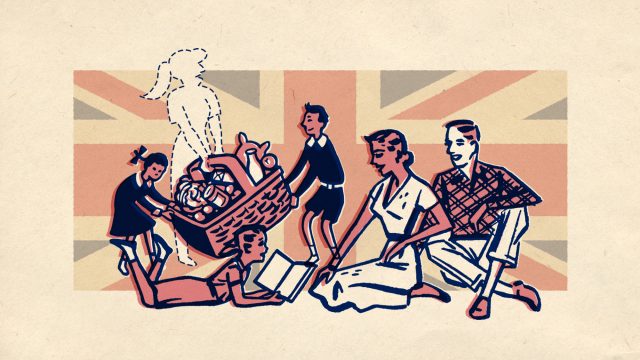
Since the Second World War, they have been “serving as the largely unmentioned glue holding middle-class families together”, but now the au pair industry has “collapsed”, according to a report.
A double blow of Brexit and a minimum wage ruling have “ruined the tradition of exchanging bed and board for help with the kids”, said The Sunday Times, and a leading trade body has waved the white flag and shut its doors.
‘Fatal setback’
The “mutually beneficial arrangement” has “existed in Europe since the end of the Second World War“, said the paper, recalling when domestic servants had “all but disappeared” and a “newly liberated cohort of young women, keen to expand their cultural boundaries, rose to meet the demand”.
Au pairs would work short stays of between three and 12 months, often attending a language school, with their board and lodgings covered by the host family, said the BBC. There were between 60,000 and 90,000 au pairs in Britain before it left the European Union, but that number had halved by 2022, said The Telegraph.
The arrangement was “dealt a crushing blow by Brexit and the barriers that came with it”, said The Sunday Times. With the end of free movement of labour from the European Union, the UK government did not provide an entry route specifically for au pairs.
Then, earlier this month, there was another, “possibly fatal”, setback, when the government announced that even live-in workers would “henceforth” be entitled to earn the minimum wage, it added.
Previously, the guidance from the Home Office suggested that au pairs should earn “pocket money” of about £90 a week in exchange for being treated as a member of the family and helping out around the house.
But now, anyone employing an au pair under 21 for the basic 25 weekly hours, even with a live-in allowance applied, will have to pay £145.07 a week, rising to £330.47 for an au pair aged over 21 working 35 hours a week.
The consequences could be wide ranging, because rising costs are “driving intelligent women out of the workplace and back into their homes”, Jo Twumasi-Ankra, a fundraiser at the Victoria and Albert Museum in London and mother to three girls, who has used au pairs, told the paper.
‘New slavery’
In the wake of these developments, the British Au Pair Agencies Association (BAPAA) announced its closure on Facebook and there are fears that the longstanding arrangement has had its day.
Back in 2020, chairwoman Jamie Shackell told the BBC that “families have said they might have to give up work and claim benefits because they cannot afford to have a nanny”. She said the group was “flummoxed by it all” because au pairs are “not a financial strain on the UK state”.
A petition calling for a “new youth visa” has gathered 60,000 signatures and it’s possible that the Treasury will look into a “fix” for au pairs, because the situation is “so dire”, with Britain’s childcare costs among the highest in the world, said The Sunday Times.
But not everyone sees such a halo above the head of the au pair arrangement. In 2002, it was described by The Guardian as the “dirty secret of Britain’s middle classes”.
Asking if au pairing was “the new slavery”, it said “horror stories” are commonplace. Maggie Dyer, director of the London Au Pair and Nanny Agency, said au pairs are “so vulnerable” as “if they lose their job they have nowhere to live, so they often will be far too frightened to complain if they are being maltreated”.
Jokes about husbands having affairs with au pairs and nannies have been around almost as long as au pairs themselves, and one scorned wife told the Daily Mail about the “heart shredding betrayal” of the experience.
Brexit and wage ruling are threatening the ‘mutually beneficial arrangement’






